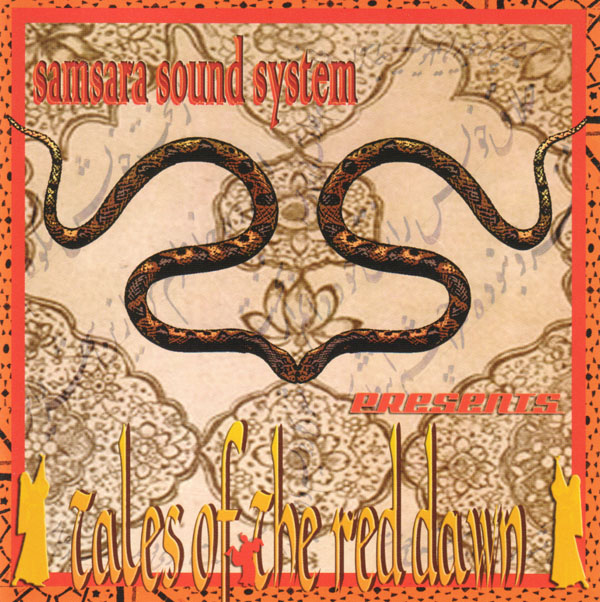SAMSARA SOUND SYSTEM


1/ Orchid Go To Heaven (SG,Deutsch,Pistel,SS,Showard) 3.25
2/ Sataya (Ghahri,Kushan,Mee) 3.01
3/ Shiraz (Ghahri,Deutsch) 3.12
4/ Between Copper Walls (Ghahri,Toshiro,Schlamminger) 2.01
5/ Dawn At the Devils Tower (Ghahri,Laswell,Kushan,Seth) 3.22
6/ Ahoura & Ahrtman (Ghahri,JT,Jaafrey,Mee) 4.28
7/ Witnessed By the Owl (Ghahri,Schlamminger,Kushan) 2.15
8/ Suspended Desires (Ghahri,Schlamminger,Toshiro) 2.54
9/ Baanaa (Ghahri,Kushan,Toshiro) 3.25
10/ Penultimate Precision (Ghahri) 1.04
11/ Round the Corner (SG,BL,DS,Dellatacoma,Mee) 4.14
12/ Kung Fu Anthem (Ghahri,Kushan,McQuinney) 3.17
13/ Fight For Flight (Ghahri,Deutsch,Kushan) 4.06
14/ Cycle In Progress (Ghahri,Kushan,Seth) 4.14
15/ Annar (Kushan,Lardeau) 4.06
16/ Encircled (Kushan,Lardeau) 5.40
Recorded at Orange Music Sound, West Orange, New Jersey
Additional Recording at Room 5 Recordings, San Francisco
Engineered by James Dellatacoma
Additional Engineering at Room 5: Mark Pistel
Produced by Sassan Ghahri (aka Professor Shehab)
Tracks 15 & 16 produced by Francois Lardeau
Mastered by Francois Lardeau
Prof. Shehab: programming, beats, loops, effects, flute (10); Mark Deutsch: bass (1,3), sitar (1), bazantar (1,3),
banjo (13); Soulsalaam: percussion (1); Grandmixer DXT: turntables (1,11); Mark Pistel: electronics (1); Alan
Kushan: santur (2,4,5,7,9,12,14,15,16), voice (2,5,9,13,14,15,16); Mee: violin (2,6,11); Fumio Toshiro: bass (4,9),
stand-up bass (8); Saam Schlamminger: zarb (4,7,8), daf (7,8); Bill Laswell: bass (5,11); Seth: guitar (5,14);
JT: trumpet (6); Jaffrey: voice (6); James Dellatacoma: guitar (11); John McQuinney: sax (12); Francois Lardeau: electronics (15,16).
2007 - Baboon Records (USA), BAB0006 (CD)
Tales of the Red Dawn - indeed, most of the work to which the Professor puts his hand (under his own name and in configurations including Qabbalah Steppers, Scarab, Ebn E Sync and Ataxia) - stands as the definitive example of how to make so-called "electronic world music" with bite, relevance and a truly global span. While the Professor may be Iranian, he is no chauvinist, but rather a student of the world of the world of sounds who graduated the hard-knock school of Brooklynīs illbient dub scene with honours and has honed his arrangement skills to a gleaming shine - witness for instance the unexpected but perfectly inserted muted trumpet played by one "J.T." on "Ahoura & Ahrtman".
Tales opens with a Subcontinental vibe accompanied by big-city turntablism care of the grandmaster DXT and the subterranean bass of multi-instrumentalist Mark Deutsch, before tablas and sitars seamlessly segue into the rhythms and santur of Persian purview. "Baanaa", though featured almost midway through the album, is a kind of cumulative, narcotic, dervish dance, with seemingly sacral singing fading in and out of the entrancing swirl.
To mix international culinary metaphors, a smorgasbord of Oriental delights which at one moment takes on a garish technicolour Bollywood before mashing up a Chinese string section into the mix of something more contemplative, with Kushan regularly raining down glittering showers of notes. Still the scarlet thread that made the Professorīs own labels Baraka Foundation and Baboon (alongside WordSound, to whom he contributed many a track) a genre unto themselves, holds the proceedings together - the love of intricate rhythms, whether they be Arabian or drumīnībass, and deep, dubby bass.
Like the pattern of a carpet from Isfahan, it is continually revealing new things to see/hear/feel, ornate patterns woven expertly into multifacetted whole. And ever so groovy.
Sassan Gari, the Professor himself, recently left the States after twenty-seven years to return to his homeland - apparently he wants to be in the thick of things in that tumultuous nation, perched on the brink of - yes, of what? Whatever the case, Gari can only contribute something positive.
Stephen Fruitman (courtesy of the Sonomu website)